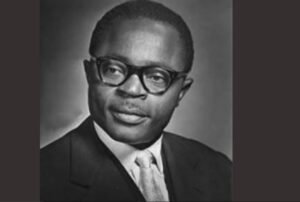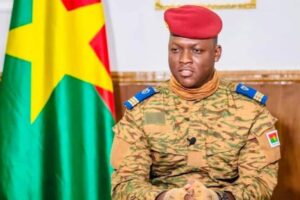Since gaining independence from France in 1960, Burkina Faso, formerly known as Upper Volta, has had a series of leaders, each contributing to the country’s history in various ways. Below is a detailed table of the Heads of State of Burkina Faso, arranged in order of their years of tenure.
READ ALSO: Presidents That Have Ruled Cameroon Till Date
| No. | Name | Tenure |
|---|---|---|
| 1 | Maurice Yaméogo | 1960 - 1966 |
| 2 | Sangoulé Lamizana | 1966 - 1980 |
| 3 | Saye Zerbo | 1980 - 1982 |
| 4 | Jean-Baptiste Ouédraogo | 1982 - 1983 |
| 5 | Thomas Sankara | 1983 - 1987 |
| 6 | Blaise Compaoré | 1987 - 2014 |
| 7 | Yacouba Isaac Zida (acting) | 2014 - 2015 |
| 8 | Michel Kafando (interim) | 2015 |
| 9 | Roch Marc Christian Kaboré | 2015 - 2022 |
| 10 | Paul-Henri Sandaogo Damiba | 2022 - 2022 |
| 11 | Ibrahim Traoré (acting) | 2022 - Present |
Maurice Yaméogo: The First Head of State

Maurice Yaméogo was the first President of Burkina Faso, then known as Upper Volta. He served from 1960, when the country gained independence, until 1966.
Achievements
- Independence Leader: Yaméogo played a significant role in leading Upper Volta to independence from France on August 5, 1960.
- Economic Initiatives: He introduced policies aimed at modernizing the agricultural sector, which was crucial for the country’s economy.
Downsides
- Authoritarian Rule: Yaméogo’s regime was marked by authoritarian practices, including the suppression of political opposition.
- Economic Strain: His economic policies led to widespread dissatisfaction, culminating in austerity measures that further strained the populace, leading to his eventual ousting by the military in 1966.
READ ALSO: Presidents That Have Ruled Madagascar Till Date
Ibrahim Traoré: The Current Head of State

Ibrahim Traoré is the acting Head of State of Burkina Faso, having assumed office in 2022.
Achievements
- Stabilization Efforts: Traoré has been focused on stabilizing the country amidst political turmoil and insecurity.
- Youth Engagement: He has made efforts to engage with the youth, recognizing their role in the country’s future.
Downsides
- Political Uncertainty: His tenure has been marked by continued political instability, with challenges in establishing a long-term governance framework.
- Security Issues: The country continues to face significant security challenges, including threats from extremist groups, which have not yet been fully addressed under his leadership.
READ ALSO: Presidents That Have Ruled Angola Till Date
Conclusion
Burkina Faso’s history has been shaped by a series of leaders, each leaving a unique imprint on the country’s development.
From Maurice Yaméogo’s pivotal role in independence to the ongoing efforts of Ibrahim Traoré, the nation’s leadership journey reflects its dynamic and often turbulent political landscape.
While challenges remain, particularly in terms of political stability and security, the resilience and engagement of its people continue to drive Burkina Faso forward.
